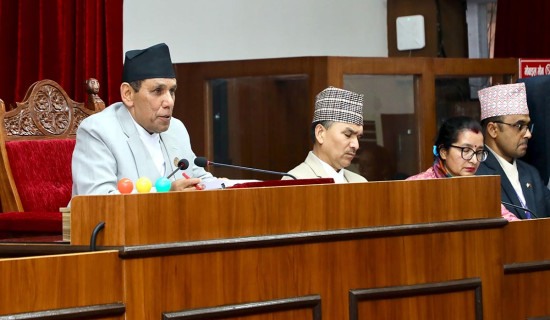- Friday, 13 February 2026
Rooting Out Corruption
Corruption is at the root of many social and economic problems throughout the world, especially in the developing countries – hindering their progress and perpetuating poverty. From petty bribes to plundering of national resources, it exists in many forms and manifestations. Corruption disproportionately harms the poor and vulnerable, increasing costs and reducing access to basic services, such as health, education, social programmes, justice etc., worsening inequality and poverty. Delays in infrastructure development, poor construction quality, delayed or shoddy service delivery, among countless others, are all signs of corruption we have become familiar with.
In a country where corruption is rampant, development suffers, and with it creation of jobs and people's aspiration for decent life. Examples abound of how entrenched corruption that served only the ruling elites at the expense of their subjects lead to mass demonstrations, destablisation and eventually to seismic shift in political power. Over time, corruption can undermine the trust and faith citizens have in the system, leaders and government institutions, creating a recipe for social friction, disintegration and, at worst, spiralling mass disenchantment. It can also undermine a country’s response to emergencies, adding to sufferers' misery.
The best antidote to corruption is good governance, adherence to which fosters an environment where corruption struggles to flourish. Key cornerstones of good governance include: honesty, transparency, responsiveness, rule of law, accountability and fairness, among others. Transparency in state's affairs and the accountability of public officials are central to the trust of citizens in their government and the effective delivery of public services. Both service providers and service recipients have roles to play to imbibe and exhibit these qualities to make good governance a ubiquitous part of lived experience.
Speaking at a meeting of the State Affairs and Good Governance Committee of the House of Representatives the other day, Prime Minister KP Sharma Oli stressed that corruption would not be tolerated and would be dealt with without leniency or favouritism. He assured that his administration remains steadfast in its commitment to fighting corruption and maintaining transparency. PM Oli's remarks reflected a firm stance against corruption and a commitment to ensuring transparent and effective governance in Nepal. The meeting focused on the rationale behind the bill to amend the Prevention of Corruption Act 2002.
To combat corruption, mere legal frameworks and institutions aren't enough; building their capacity to enforce laws to prevent, investigate, detect, and prosecute corruption is also indispensable. Working to rebuild and bolster trust between citizens and the state is critical at a time when slow economic growth and cost-of-living crisis worldwide have frustrated hundreds of millions of people, creating a breeding ground for conflict and violence to flare up. Corruption eats into the nation’s wealth, diverting money away from critical projects, starving the people dependent on such projects of the much-needed money or government support.
As shown by countless studies, corruption stymies investment, discourages trade, reduces economic growth and slows down development pace. Corruption these days has increasingly become a cross-border issue. That's because, with the dramatic advancement in technology, it has become a lot easier for money to flow from one country to another undetected, making it easy to hide ill-gotten wealth. Against this backdrop, keeping abreast with the counter technology that addresses such concerns and playing catch up seems to be the way forward.
















-original-thumb.jpg)
